Michael Swanwick's Blog, page 94
November 27, 2017
Three From Dragonstairs!
.
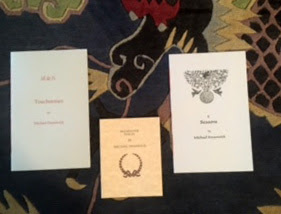
There are two new chapbooks available from Dragonstairs Press, which is (this needs to be said occasionally) not my but Marianne Porter's tabletop publishing empire. These are handmade, hand-stitched labors of love. And if you go to the Dragonstairs website, you'll see that these things sell out pretty handily.
One reason for this is the price. When Marianne started making chapbooks, I asked around for how much she should charge and got two contradictory pieces of advice. Lawrence Person said, "Anything more than ten dollars and it stops being an impulse buy." But David Hartwell said, "Start at fifty dollars. Anything less and the serious collectors won't touch it." I relayed both remarks to Marianne who, horrified at the thought of soaking her customers, decided she would sell to frivolous collectors only. I personally harbor the belief that somewhere twenty or thirty years down the line, these will turn out to be very good investments indeed.
But mostly it's because they're lovely items.
They are:
Midwinter Fables by Michael Swanwick
Four of Aesop's fables, retold. Edition of 110 copies, signed and numbered.
Six dollars in the U. S. Seven dollars elsewhere.
This is my annual Solstice chapbook, created last December but only just now available to buy. The Dragonstairs site will tell you there are 34 copies available, but since they went on sale yesterday, there are actually only 24. These always sell out before Christmas so if you want one for that special bibliophile on your gift list, you'd best move fast.
And:
Touchstones by Michael Swanwick
Three personal stories (one previously published on Flogging Babel) and an afterword. Published in an edition of 50, to mark Swanwick's participation in the Fourth Chengdu International Science Fiction Conference.
Roughly half of these were given away to friends and colleagues in China. The Dragonstairs site says that 24 are available, but currently the number is 14.
Also still available is:
Five Seasons by Michael Swanwick. Five short short stories, independent but interrelated. Edition of 100, signed and numbered.
I don't ordinarily issue a caution about my own fiction, but since this is the holiday season, I ought to mention that these stories -- written to meet a challenge to divide the year into five seasons -- came out a little grim. That said, I think they're pretty damn glorious. Dragonstairs would have you believe that 28 are available. The actual number is 24.
You can find the Dragonstairs website here. And while you're looking, why not scroll down to see all the cool stuff no longer available for sale?
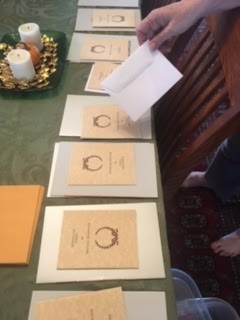
Above top: All three publications on the Dragonstairs office rug. Immediately above: The Barefoot Publisher herself, assembling packages to be mailed out.
*

There are two new chapbooks available from Dragonstairs Press, which is (this needs to be said occasionally) not my but Marianne Porter's tabletop publishing empire. These are handmade, hand-stitched labors of love. And if you go to the Dragonstairs website, you'll see that these things sell out pretty handily.
One reason for this is the price. When Marianne started making chapbooks, I asked around for how much she should charge and got two contradictory pieces of advice. Lawrence Person said, "Anything more than ten dollars and it stops being an impulse buy." But David Hartwell said, "Start at fifty dollars. Anything less and the serious collectors won't touch it." I relayed both remarks to Marianne who, horrified at the thought of soaking her customers, decided she would sell to frivolous collectors only. I personally harbor the belief that somewhere twenty or thirty years down the line, these will turn out to be very good investments indeed.
But mostly it's because they're lovely items.
They are:
Midwinter Fables by Michael Swanwick
Four of Aesop's fables, retold. Edition of 110 copies, signed and numbered.
Six dollars in the U. S. Seven dollars elsewhere.
This is my annual Solstice chapbook, created last December but only just now available to buy. The Dragonstairs site will tell you there are 34 copies available, but since they went on sale yesterday, there are actually only 24. These always sell out before Christmas so if you want one for that special bibliophile on your gift list, you'd best move fast.
And:
Touchstones by Michael Swanwick
Three personal stories (one previously published on Flogging Babel) and an afterword. Published in an edition of 50, to mark Swanwick's participation in the Fourth Chengdu International Science Fiction Conference.
Roughly half of these were given away to friends and colleagues in China. The Dragonstairs site says that 24 are available, but currently the number is 14.
Also still available is:
Five Seasons by Michael Swanwick. Five short short stories, independent but interrelated. Edition of 100, signed and numbered.
I don't ordinarily issue a caution about my own fiction, but since this is the holiday season, I ought to mention that these stories -- written to meet a challenge to divide the year into five seasons -- came out a little grim. That said, I think they're pretty damn glorious. Dragonstairs would have you believe that 28 are available. The actual number is 24.
You can find the Dragonstairs website here. And while you're looking, why not scroll down to see all the cool stuff no longer available for sale?

Above top: All three publications on the Dragonstairs office rug. Immediately above: The Barefoot Publisher herself, assembling packages to be mailed out.
*
Published on November 27, 2017 09:15
November 24, 2017
The Season Begins
.

When I was a boy in Winooski, Vermont, there was an unspoken rivalry in the neighborhood over who got their Christmas lights up first. Nobody, of course, put up lights before Thanksgiving. That would be rushing the season and absurd to boot.
But one year my mother, who had a strong artistic streak, carved our pumpkins and, instead of candles, put a colored electric bulb in each. The kind that went on Christmas trees, one orange and one yellow. They looked great. If you carve your own pumpkins, I recommend you try it some year.
We didn't know that down at the bottom of the street, a competitive soul looked up and, since it was too distant to see the pumpkins, saw only the colored lights.
The next year in early October, a week before we set out pumpkins, our competitive neighbor had his house covered with Christmas lights!
All of which is prelude to this:
Today we -- by which, of course, I mean Marianne -- put out our Christmas lights. That's a picture of some of them up above.
*

When I was a boy in Winooski, Vermont, there was an unspoken rivalry in the neighborhood over who got their Christmas lights up first. Nobody, of course, put up lights before Thanksgiving. That would be rushing the season and absurd to boot.
But one year my mother, who had a strong artistic streak, carved our pumpkins and, instead of candles, put a colored electric bulb in each. The kind that went on Christmas trees, one orange and one yellow. They looked great. If you carve your own pumpkins, I recommend you try it some year.
We didn't know that down at the bottom of the street, a competitive soul looked up and, since it was too distant to see the pumpkins, saw only the colored lights.
The next year in early October, a week before we set out pumpkins, our competitive neighbor had his house covered with Christmas lights!
All of which is prelude to this:
Today we -- by which, of course, I mean Marianne -- put out our Christmas lights. That's a picture of some of them up above.
*
Published on November 24, 2017 15:13
November 3, 2017
And As Always...
.

I'm on the road again! I'm off to the Fourth China International Science Fiction Conference in Chengdu. Chengdu is the capital of Sichuan Province and, not coincidentally, the home city of Science Fiction World. Which has, as its many friends like to point out, the largest readership of any science fiction magazine in the world.
I will do my best to keep in touch. But the winds of politics are fickle and the Great Firewall is no joke. So I can guarantee nothing. I think I've found an honest and legal workaround. We shall see. If it doesn't work, I'll share my adventures with you upon my return.
With me safe travels!
*

I'm on the road again! I'm off to the Fourth China International Science Fiction Conference in Chengdu. Chengdu is the capital of Sichuan Province and, not coincidentally, the home city of Science Fiction World. Which has, as its many friends like to point out, the largest readership of any science fiction magazine in the world.
I will do my best to keep in touch. But the winds of politics are fickle and the Great Firewall is no joke. So I can guarantee nothing. I think I've found an honest and legal workaround. We shall see. If it doesn't work, I'll share my adventures with you upon my return.
With me safe travels!
*
Published on November 03, 2017 00:30
November 2, 2017
Sales! Sales! Sales!
.
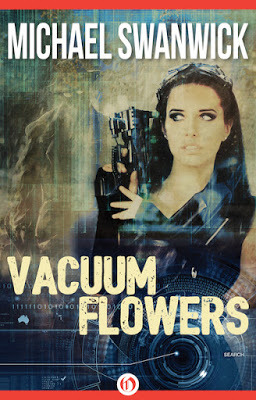
Despite my blog's title, I don't flog my books all that often here. I have publishers to do that for me. But a good deal is a good deal, so when my stuff is put on sale, I figure I have an obligation to those who might want to read it. So here goes.
(I'll pause for a second to put on my straw hat and grab my cane. And...)
Good news for ebook bargain hunters! Open Road Media , my favorite ebook publisher, has just announced a binge of one-day-only sales of my books. It begins with Vacuum Flowers being featured in The Portalist's weekly deals newsletter, on this coming Sunday, November 5. The ebook will be downpriced to 1.99 across all US retailers on that day.
But that’s only the beginning! Vacuum Flowers will be featured in Early Bird Books ( EBB ), Open Roads Media’s daily deals newsletter, on November 17. The ebook will be downpriced to 1.99 across all US retailers on that day and that day only.
And that’s still not all! Bones of the Earth, In the Drift, and Vacuum Flowers will be featured in The Portalist on November 19. Again, the ebooks will be downpriced to 1.99 across all US retailers on that day.
Remember, these are one-day-only deals. So if you read e-books and you’re curious about any of the above titles, mark it down on your e-calendars.
You can subscribe to EBB here so that you'll get the direct link to the deal on the day that it appears in the newsletter.
You can subscribe to The Portalist , the premier digital destination for fans of science fiction and fantasy, hereso that you’ll get the direct link to the deal on the day that it appears in the newsletter.
*

Despite my blog's title, I don't flog my books all that often here. I have publishers to do that for me. But a good deal is a good deal, so when my stuff is put on sale, I figure I have an obligation to those who might want to read it. So here goes.
(I'll pause for a second to put on my straw hat and grab my cane. And...)
Good news for ebook bargain hunters! Open Road Media , my favorite ebook publisher, has just announced a binge of one-day-only sales of my books. It begins with Vacuum Flowers being featured in The Portalist's weekly deals newsletter, on this coming Sunday, November 5. The ebook will be downpriced to 1.99 across all US retailers on that day.
But that’s only the beginning! Vacuum Flowers will be featured in Early Bird Books ( EBB ), Open Roads Media’s daily deals newsletter, on November 17. The ebook will be downpriced to 1.99 across all US retailers on that day and that day only.
And that’s still not all! Bones of the Earth, In the Drift, and Vacuum Flowers will be featured in The Portalist on November 19. Again, the ebooks will be downpriced to 1.99 across all US retailers on that day.
Remember, these are one-day-only deals. So if you read e-books and you’re curious about any of the above titles, mark it down on your e-calendars.
You can subscribe to EBB here so that you'll get the direct link to the deal on the day that it appears in the newsletter.
You can subscribe to The Portalist , the premier digital destination for fans of science fiction and fantasy, hereso that you’ll get the direct link to the deal on the day that it appears in the newsletter.
*
Published on November 02, 2017 09:34
November 1, 2017
My Favorite City Stoop In All The World
.

Philadelphia has a temporary art project going on now called Monument Lab. Artists were given a free hand to reimagine and comment on the concept of monuments. One of the most pleasing of which was the replacement of several park benches with actual city stoops, salvaged from demolished houses throughout the city. People stop to sit on them, hang out, flirt, do all the usual things people do on stoops in the city.
Up above is my favorite stoop in all Philadelphia, the one to 280 S. 23rd Street. That's where Marianne Porter lived long ago when we were both in our twenties and working at the Commonwealth of Pennsylvania's Bureau of Laboratories. My apartment was only two doors down. We were friends then, but there was not the least hint of romance in the air.
Then, one bright Saturday morning, I was taking a duffle of dirty clothes to the laundromat and saw Marianne sitting with her father on the stoop, eating ice cream cones. I stopped to say hello, we had a brief, innocent chat, and I went on my way. Not one of us had the slightest inkling that the world had just changed, changed utterly.
Roughly a year later, we stood in front of an altar and, in front of God and our families and friends, pledged our lives to each other.
That was thirty-seven years ago today, and we are still married. Happy anniversary, Sweetie. And many, many more to come.
You can read about Monument Lab here.
*

Philadelphia has a temporary art project going on now called Monument Lab. Artists were given a free hand to reimagine and comment on the concept of monuments. One of the most pleasing of which was the replacement of several park benches with actual city stoops, salvaged from demolished houses throughout the city. People stop to sit on them, hang out, flirt, do all the usual things people do on stoops in the city.
Up above is my favorite stoop in all Philadelphia, the one to 280 S. 23rd Street. That's where Marianne Porter lived long ago when we were both in our twenties and working at the Commonwealth of Pennsylvania's Bureau of Laboratories. My apartment was only two doors down. We were friends then, but there was not the least hint of romance in the air.
Then, one bright Saturday morning, I was taking a duffle of dirty clothes to the laundromat and saw Marianne sitting with her father on the stoop, eating ice cream cones. I stopped to say hello, we had a brief, innocent chat, and I went on my way. Not one of us had the slightest inkling that the world had just changed, changed utterly.
Roughly a year later, we stood in front of an altar and, in front of God and our families and friends, pledged our lives to each other.
That was thirty-seven years ago today, and we are still married. Happy anniversary, Sweetie. And many, many more to come.
You can read about Monument Lab here.
*
Published on November 01, 2017 14:49
October 30, 2017
Brown Autumn
.

On Monday, I put up a Halloween story here. I was going to write it on fallen leaves, but this year the weather was dry and the frost was late, so we had a Brown Autumn. There weren't the variety of bright leaves such a story needs. Consequently, I made do with a single illustration and the story in text.
Halloween has come and gone and so I've taken down the story.
Next year, if the leaves turn early and bright enough, I'll write the story out the way I originally intended, one word per leaf, and post it again.
Until then, stay warm and keep reading.
Above: A leaf. Beautiful, isn't it? Last year at this time, a leaf from that same tree was blazing scarlet.
*
Published on October 30, 2017 12:26
Your Halloween Story: In the North Wind's Wake
.
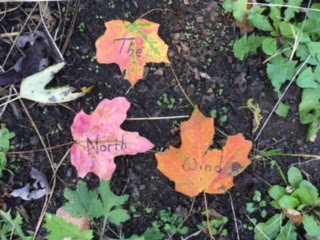
It's been a Brown Autumn. First the weather was dry and then the frosts came late. Trees whose leaves usually turn to red and yellow and orange flames showed hardly any color at all. Normally, at this time of year, I write a short Halloween story and write it on leaves, one word per leaf. But there just wasn't the variety of colors needed for that to work.
Tomorrow's still Halloween, though. Next year, if the leaves turn earlier and brighter than they did in this dun season, I'll write the story I wrote on them and share it with you. In the meantime, here's the story itself:
In the North Wind’s Wake
The North Wind flies down from her fortress on the moon, clad only in a scattering of Autumn leaves. Shameless, she runs her hands up under your clothes and makes you flesh shiver with fear and desire. When you’re abed, she hammers on the walls of your house and rattles the windows, trying to get in. Come out and play, the moans. I know games that will take years off of your life.
At midnight, deep in the forest, the North Wind cavorts with Night. Endlessly fertile, they leave behind offspring you can feel but not see. What’s that sensation of dread? Who’s that lurking behind your back? A ghoul, a ghost, a goblin, a witch?
Yes, and worse.
Still she tugs at your scarf and snatces away your hat. Whispering, Come play, come play.
On Samhain the North Wind ditches Night – for she is nothing if not fickle – and takes Death for a lover. The pleasures of their unholy union are not for you to know.
Yet.
In the morning, the North Wind is gone. All the world is calm and serene. But there is an uneasiness around the edges, a creeping sensation that everything you fear is only a gasp and a shriek away.
The North Wind has countless offspring sired by Night and only one by Death. Yet that one is more powerful than all the others combined.
Her name is Winter and she has plans for you.
Above: The opening words written on leaves on my future gravesite. Alas, while there were some bright leaves, there were not enough. "In the North Wind's Wake" is copyright 2017 by Michael Swanwick. All rights reserved. This means it may not legally be reproduced without my express permission.
*

It's been a Brown Autumn. First the weather was dry and then the frosts came late. Trees whose leaves usually turn to red and yellow and orange flames showed hardly any color at all. Normally, at this time of year, I write a short Halloween story and write it on leaves, one word per leaf. But there just wasn't the variety of colors needed for that to work.
Tomorrow's still Halloween, though. Next year, if the leaves turn earlier and brighter than they did in this dun season, I'll write the story I wrote on them and share it with you. In the meantime, here's the story itself:
In the North Wind’s Wake
The North Wind flies down from her fortress on the moon, clad only in a scattering of Autumn leaves. Shameless, she runs her hands up under your clothes and makes you flesh shiver with fear and desire. When you’re abed, she hammers on the walls of your house and rattles the windows, trying to get in. Come out and play, the moans. I know games that will take years off of your life.
At midnight, deep in the forest, the North Wind cavorts with Night. Endlessly fertile, they leave behind offspring you can feel but not see. What’s that sensation of dread? Who’s that lurking behind your back? A ghoul, a ghost, a goblin, a witch?
Yes, and worse.
Still she tugs at your scarf and snatces away your hat. Whispering, Come play, come play.
On Samhain the North Wind ditches Night – for she is nothing if not fickle – and takes Death for a lover. The pleasures of their unholy union are not for you to know.
Yet.
In the morning, the North Wind is gone. All the world is calm and serene. But there is an uneasiness around the edges, a creeping sensation that everything you fear is only a gasp and a shriek away.
The North Wind has countless offspring sired by Night and only one by Death. Yet that one is more powerful than all the others combined.
Her name is Winter and she has plans for you.
Above: The opening words written on leaves on my future gravesite. Alas, while there were some bright leaves, there were not enough. "In the North Wind's Wake" is copyright 2017 by Michael Swanwick. All rights reserved. This means it may not legally be reproduced without my express permission.
*
Published on October 30, 2017 12:26
October 27, 2017
This Week in Glitterati History
.
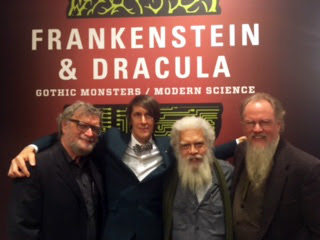
I attended two local literary events here in Philadelphia this week. Not bad, eh? The first was the premier of the SFWA-sponsored reading series Galactic Philadelphia, held Tuesday in the fireplace room of the Irish Pub.
Reading were Gardner Dozois and Lara Elena Donnelly. A pretty high-powered crowd of people showed up, including Lawrence Schoen, Gregory Frost, Samuel R. Delany, and Sally Grotta. Plus, of course, the proverbial others.
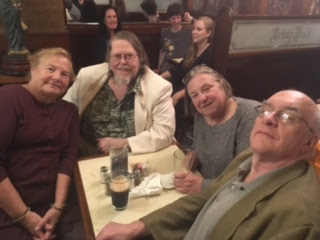
Pictured above are (l-r): Marianne Porter, Gardner Dozois, Susan McAninley and Frank Crean. Sitting about, talking, before the event began.
Both readings were very well received indeed. The crowd was warm and friendly and the atmosphere was notably gemutlich. Bill West took a terrific shot of the crowd smiling in appreciation of Gardner's reading which Delany posted on Facebook. I don't snipe people's FB photos. But if you use Facebook, you can find it there.
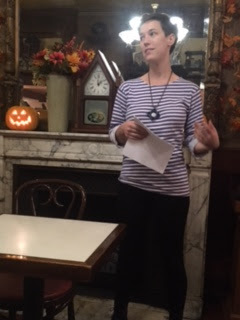
Pictured above: Lara Elena Donnelly. The photo, I hope, hints at her quite excellent stage presence.
So the evening was a complete success.
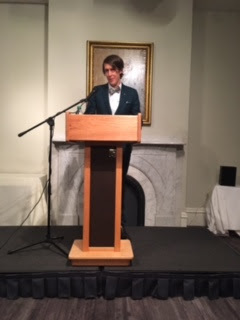
Equally good, as far as I'm concerned, was Henry Wessells' lecture on Mary Shelly and Frankenstein at the Rosenbach Museum and Library. The Rosenbach has a fabled collection of rare books and manuscripts, and is currently celebrating the centenary of the writing of both Frankenstein and Dracula with a small but stunning display of related materials. I don't know about you, but having the opportunity to read from some of the original manuscript pages of Frankenstein: or the New Prometheus, and see the changes and corrections that Mary Shelly made as she was writing it, fto follow the workings of that brilliant mind, illed me with wonder.
I won't give you the Cliff Notes version of Henry's lecture. (Henry is a bookman and works for James Cummins, Bookseller; he once handed me a Shakespeare Second Folia; he really does know his stuff.) Other than to say that he holds to the belief that Frankenstein was the first science fiction novel and that he took the presence of two doubters in the audience (me and Chip Delany, though for different reasons) with grace and good humor. And that it was very well received by the audience. And that he provided those present with a great literary trivia question:What were the first words spoken by the Creature in the novel?
That's Henry up above.
The lecture was part of a series of events scheduled to support the exhibit, arranged by Edward G. Pettit, the Manager of Public Programs for the Rosenbach. Best known locally as "the Philly Poe Guy." The man knows pretty much everything about Gothic literature.
So the evening was a success. How big a success? When we got home, Marianne and I went onto the Rosenbach website and bought memberships.
And I know you're wondering, so....
The first words the Creature says in the novel are, "Forgive this intrusion."
Above, top:Michael Swanwick, Henry Wessells, Samuel R. Delany, and Edward G. Pettit, being literary in Philadelphia.
*

I attended two local literary events here in Philadelphia this week. Not bad, eh? The first was the premier of the SFWA-sponsored reading series Galactic Philadelphia, held Tuesday in the fireplace room of the Irish Pub.
Reading were Gardner Dozois and Lara Elena Donnelly. A pretty high-powered crowd of people showed up, including Lawrence Schoen, Gregory Frost, Samuel R. Delany, and Sally Grotta. Plus, of course, the proverbial others.

Pictured above are (l-r): Marianne Porter, Gardner Dozois, Susan McAninley and Frank Crean. Sitting about, talking, before the event began.
Both readings were very well received indeed. The crowd was warm and friendly and the atmosphere was notably gemutlich. Bill West took a terrific shot of the crowd smiling in appreciation of Gardner's reading which Delany posted on Facebook. I don't snipe people's FB photos. But if you use Facebook, you can find it there.

Pictured above: Lara Elena Donnelly. The photo, I hope, hints at her quite excellent stage presence.
So the evening was a complete success.

Equally good, as far as I'm concerned, was Henry Wessells' lecture on Mary Shelly and Frankenstein at the Rosenbach Museum and Library. The Rosenbach has a fabled collection of rare books and manuscripts, and is currently celebrating the centenary of the writing of both Frankenstein and Dracula with a small but stunning display of related materials. I don't know about you, but having the opportunity to read from some of the original manuscript pages of Frankenstein: or the New Prometheus, and see the changes and corrections that Mary Shelly made as she was writing it, fto follow the workings of that brilliant mind, illed me with wonder.
I won't give you the Cliff Notes version of Henry's lecture. (Henry is a bookman and works for James Cummins, Bookseller; he once handed me a Shakespeare Second Folia; he really does know his stuff.) Other than to say that he holds to the belief that Frankenstein was the first science fiction novel and that he took the presence of two doubters in the audience (me and Chip Delany, though for different reasons) with grace and good humor. And that it was very well received by the audience. And that he provided those present with a great literary trivia question:What were the first words spoken by the Creature in the novel?
That's Henry up above.
The lecture was part of a series of events scheduled to support the exhibit, arranged by Edward G. Pettit, the Manager of Public Programs for the Rosenbach. Best known locally as "the Philly Poe Guy." The man knows pretty much everything about Gothic literature.
So the evening was a success. How big a success? When we got home, Marianne and I went onto the Rosenbach website and bought memberships.
And I know you're wondering, so....
The first words the Creature says in the novel are, "Forgive this intrusion."
Above, top:Michael Swanwick, Henry Wessells, Samuel R. Delany, and Edward G. Pettit, being literary in Philadelphia.
*
Published on October 27, 2017 15:13
October 25, 2017
Why Your First Novel EVEN MORE Shouldn't Be Volume One of a Trilogy
.
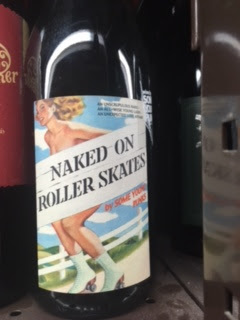
It needs to be said regularly: Don't start your career with a trilogy. I first published the essay below in 2010, but everything in it still applies.
Plus, I've added three more reasons why this is such a bad idea. Simply because over the years, people who made this mistake shared yet more regrets with me.
Read, learn, and send the link for this to friends who are gonnabe writers. The poverty and grief this prevents could be your own.
Why Your First Novel Shouldn't Be Volume One of a Trilogy
Three reasons, basically. One is artistic, the second psychological, and the third pragmatic.
The artistic reason is that at the beginning of your career, you're learning faster and improving more swiftly than you ever will again. That, and the fact that the mere act of publishing a book makes you a better writer, means that the prose styles of your first and second volumes will probably be considerably different. Most readers won't pick up on this. But the best ones will. And your very best reader is yourself. It's going to bug you to your dying day.
The psychological reason is that nine chances out of ten, no matter how much you love your first novel when it's fresh out of the oven, several years down the line you're going to end up disliking it. It may not deserve your dislike. But this is an observable phenomenon. Writers wind up being embarrassed by their first. And if your first is volume one of a trilogy, that's three books you're going to end up unhappy about.
The first two reasons are trivial, really. But the pragmatic one is desperately important. Here it is:
The timing of publishing is such that the "numbers" for your first book -- the sales figures, basically, the book's profitability -- won't be available by the time you turn in the second volume. Since your editor liked the first book, the second one is a pretty sure sale. But by the time you've finished writing the third volume, however, your publishing house will know the numbers. And if the numbers aren't good, the book will not be bought.
Which means that book will not be sellable. No other publisher will want to buy volume three of a trilogy whose first two volumes are owned by another house. You'll have to wait until your first two books are out of print, revert the rights, and try to sell the trilogy anew. But that will take years, and your dream-child will at that point be damaged goods. Unless you've subsequently become extremely popular, it will probably still be unsellable.
Imagine how it must feel to have two published novels under your belt and then find you can't sell your third. It must feel exactly like being fired for incompetence. It is going to discourage the hell out of you.
But wait! There's more!
Let's imagine that your first two books luck out and your editor wants the third. That means you're stuck with that editor. If you like the editor, that's good news. But if you and your editor can't agree on what your books should be... If you fight like cats and dogs... If you think he or she is crazy or vindictive or just doesn't know the job... Then you've got years of misery in front of you.
Nor does it end there. Let's imagine that you signed a three-volume contract on the strength of your first book. It makes perfect sense for the editor to do that. It locks you in at as low an advance as you're ever likely to get in your career for books Two and Three. If the first two don't sell, the editor can cut losses, fork over the advance, and wash his or her hands of you. Plus, if your agent wasn't paying attention, the contracts will have a "basket accounting" clause.
What, you ask, is this? It's a very simple way of not paying royalties for as long as possible. Let's say you get an advance of seven thousand dollars per book, half payable upon delivery of the book and half upon publication (a publishing term meaning anywhere between six to eighteen months after publication). And let's say your book earns out (sells enough copies to pay for your advance). In fact, it earns ten thousand dollars. That means they owe you three grand, right?
Not with basket accounting. With this clause, you don't get a penny in royalties until all three books have earned out. So your second book brings in another ten thousand? That's six thousand dollars they don't have to fork over until well after your third book is published.
By which time, you're likely to be feeling a little annoyed at your agent for letting you sign the contract in the first place. Which is the sixth reason why starting your career with a trilogy is a bad idea.
A writer's relationship with his or her agent is extremely important. Much the same as I was lucky in love, I was lucky in agents. But I've known many people who couldn't get along with their agents at all. Maybe they wanted to write Regency romances and the agent wanted them to writer SF thrillers. Maybe the agent had no interest in the sort of thing they wrote and went about selling it with all the enthusiasm of a vegan peddling calf's liver. The reason doesn't matter. Because, just as you're stuck with your editor, you're stuck with your agent. A new agent isn't going to want to pick you up mid-trilogy. Your current agent isn't going to let go control of a book they went through a lot of trouble to sell. So there you are.
Fighting with your editor, bickering with your agent, and watching your books rack up royalties that you won't get to touch for years.
And remember. . .
If you simply must write a trilogy, then go on ahead with a clean conscience. All the best books are books that the the author had no choice but to write. And all writing advice is like pantyhose -- anybody who tells you that "one size fits all" is lying.
But if any or all of the evils detailed above happen to your career, don't say that nobody warned you.
Above: A bottle of wine from Some Young Punks Winery. Just to cut the mood of doom and gloom.
*

It needs to be said regularly: Don't start your career with a trilogy. I first published the essay below in 2010, but everything in it still applies.
Plus, I've added three more reasons why this is such a bad idea. Simply because over the years, people who made this mistake shared yet more regrets with me.
Read, learn, and send the link for this to friends who are gonnabe writers. The poverty and grief this prevents could be your own.
Why Your First Novel Shouldn't Be Volume One of a Trilogy
Three reasons, basically. One is artistic, the second psychological, and the third pragmatic.
The artistic reason is that at the beginning of your career, you're learning faster and improving more swiftly than you ever will again. That, and the fact that the mere act of publishing a book makes you a better writer, means that the prose styles of your first and second volumes will probably be considerably different. Most readers won't pick up on this. But the best ones will. And your very best reader is yourself. It's going to bug you to your dying day.
The psychological reason is that nine chances out of ten, no matter how much you love your first novel when it's fresh out of the oven, several years down the line you're going to end up disliking it. It may not deserve your dislike. But this is an observable phenomenon. Writers wind up being embarrassed by their first. And if your first is volume one of a trilogy, that's three books you're going to end up unhappy about.
The first two reasons are trivial, really. But the pragmatic one is desperately important. Here it is:
The timing of publishing is such that the "numbers" for your first book -- the sales figures, basically, the book's profitability -- won't be available by the time you turn in the second volume. Since your editor liked the first book, the second one is a pretty sure sale. But by the time you've finished writing the third volume, however, your publishing house will know the numbers. And if the numbers aren't good, the book will not be bought.
Which means that book will not be sellable. No other publisher will want to buy volume three of a trilogy whose first two volumes are owned by another house. You'll have to wait until your first two books are out of print, revert the rights, and try to sell the trilogy anew. But that will take years, and your dream-child will at that point be damaged goods. Unless you've subsequently become extremely popular, it will probably still be unsellable.
Imagine how it must feel to have two published novels under your belt and then find you can't sell your third. It must feel exactly like being fired for incompetence. It is going to discourage the hell out of you.
But wait! There's more!
Let's imagine that your first two books luck out and your editor wants the third. That means you're stuck with that editor. If you like the editor, that's good news. But if you and your editor can't agree on what your books should be... If you fight like cats and dogs... If you think he or she is crazy or vindictive or just doesn't know the job... Then you've got years of misery in front of you.
Nor does it end there. Let's imagine that you signed a three-volume contract on the strength of your first book. It makes perfect sense for the editor to do that. It locks you in at as low an advance as you're ever likely to get in your career for books Two and Three. If the first two don't sell, the editor can cut losses, fork over the advance, and wash his or her hands of you. Plus, if your agent wasn't paying attention, the contracts will have a "basket accounting" clause.
What, you ask, is this? It's a very simple way of not paying royalties for as long as possible. Let's say you get an advance of seven thousand dollars per book, half payable upon delivery of the book and half upon publication (a publishing term meaning anywhere between six to eighteen months after publication). And let's say your book earns out (sells enough copies to pay for your advance). In fact, it earns ten thousand dollars. That means they owe you three grand, right?
Not with basket accounting. With this clause, you don't get a penny in royalties until all three books have earned out. So your second book brings in another ten thousand? That's six thousand dollars they don't have to fork over until well after your third book is published.
By which time, you're likely to be feeling a little annoyed at your agent for letting you sign the contract in the first place. Which is the sixth reason why starting your career with a trilogy is a bad idea.
A writer's relationship with his or her agent is extremely important. Much the same as I was lucky in love, I was lucky in agents. But I've known many people who couldn't get along with their agents at all. Maybe they wanted to write Regency romances and the agent wanted them to writer SF thrillers. Maybe the agent had no interest in the sort of thing they wrote and went about selling it with all the enthusiasm of a vegan peddling calf's liver. The reason doesn't matter. Because, just as you're stuck with your editor, you're stuck with your agent. A new agent isn't going to want to pick you up mid-trilogy. Your current agent isn't going to let go control of a book they went through a lot of trouble to sell. So there you are.
Fighting with your editor, bickering with your agent, and watching your books rack up royalties that you won't get to touch for years.
And remember. . .
If you simply must write a trilogy, then go on ahead with a clean conscience. All the best books are books that the the author had no choice but to write. And all writing advice is like pantyhose -- anybody who tells you that "one size fits all" is lying.
But if any or all of the evils detailed above happen to your career, don't say that nobody warned you.
Above: A bottle of wine from Some Young Punks Winery. Just to cut the mood of doom and gloom.
*
Published on October 25, 2017 00:30
Why Your FIrst Novel EVEN MORE Shouldn't Be Volume One of a Trilogy
.

It needs to be said regularly: Don't start your career with a trilogy. I first published the essay below in 2010, but everything in it still applies.
Plus, I've added three more reasons why this is such a bad idea. Simply because over the years, people who made this mistake shared yet more regrets with me.
Read, learn, and send the link for this to friends who are gonnabe writers. The poverty and grief this prevents could be your own.
Why Your First Novel Shouldn't Be Volume One of a Trilogy
Three reasons, basically. One is artistic, the second psychological, and the third pragmatic.
The artistic reason is that at the beginning of your career, you're learning faster and improving more swiftly than you ever will again. That, and the fact that the mere act of publishing a book makes you a better writer, means that the prose styles of your first and second volumes will probably be considerably different. Most readers won't pick up on this. But the best ones will. And your very best reader is yourself. It's going to bug you to your dying day.
The psychological reason is that nine chances out of ten, no matter how much you love your first novel when it's fresh out of the oven, several years down the line you're going to end up disliking it. It may not deserve your dislike. But this is an observable phenomenon. Writers wind up being embarrassed by their first. And if your first is volume one of a trilogy, that's three books you're going to end up unhappy about.
The first two reasons are trivial, really. But the pragmatic one is desperately important. Here it is:
The timing of publishing is such that the "numbers" for your first book -- the sales figures, basically, the book's profitability -- won't be available by the time you turn in the second volume. Since your editor liked the first book, the second one is a pretty sure sale. But by the time you've finished writing the third volume, however, your publishing house will know the numbers. And if the numbers aren't good, the book will not be bought.
Which means that book will not be sellable. No other publisher will want to buy volume three of a trilogy whose first two volumes are owned by another house. You'll have to wait until your first two books are out of print, revert the rights, and try to sell the trilogy anew. But that will take years, and your dream-child will at that point be damaged goods. Unless you've subsequently become extremely popular, it will probably still be unsellable.
Imagine how it must feel to have two published novels under your belt and then find you can't sell your third. It must feel exactly like being fired for incompetence. It is going to discourage the hell out of you.
But wait! There's more!
Let's imagine that your first two books luck out and your editor wants the third. That means you're stuck with that editor. If you like the editor, that's good news. But if you and your editor can't agree on what your books should be... If you fight like cats and dogs... If you think he or she is crazy or vindictive or just doesn't know the job... Then you've got years of misery in front of you.
Nor does it end there. Let's imagine that you signed a three-volume contract on the strength of your first book. It makes perfect sense for the editor to do that. It locks you in at as low an advance as you're ever likely to get in your career for books Two and Three. If the first two don't sell, the editor can cut losses, fork over the advance, and wash his or her hands of you. Plus, if your agent wasn't paying attention, the contracts will have a "basket accounting" clause.
What, you ask, is this? It's a very simple way of not paying royalties for as long as possible. Let's say you get an advance of seven thousand dollars per book, half payable upon delivery of the book and half upon publication (a publishing term meaning anywhere between six to eighteen months after publication). And let's say your book earns out (sells enough copies to pay for your advance). In fact, it earns ten thousand dollars. That means they owe you three grand, right?
Not with basket accounting. With this clause, you don't get a penny in royalties until all three books have earned out. So your second book brings in another ten thousand? That's six thousand dollars they don't have to fork over until well after your third book is published.
By which time, you're likely to be feeling a little annoyed at your agent for letting you sign the contract in the first place. Which is the sixth reason why starting your career with a trilogy is a bad idea.
A writer's relationship with his or her agent is extremely important. Much the same as I was lucky in love, I was lucky in agents. But I've known many people who couldn't get along with their agents at all. Maybe they wanted to write Regency romances and the agent wanted them to writer SF thrillers. Maybe the agent had no interest in the sort of thing they wrote and went about selling it with all the enthusiasm of a vegan peddling calf's liver. The reason doesn't matter. Because, just as you're stuck with your editor, you're stuck with your agent. A new agent isn't going to want to pick you up mid-trilogy. Your current agent isn't going to let go control of a book they went through a lot of trouble to sell. So there you are.
Fighting with your editor, bickering with your agent, and watching your books rack up royalties that you won't get to touch for years.
And remember. . .
If you simply must write a trilogy, then go on ahead with a clean conscience. All the best books are books that the the author had no choice but to write. And all writing advice is like pantyhose -- anybody who tells you that "one size fits all" is lying.
But if any or all of the evils detailed above happen to your career, don't say that nobody warned you.
Above: A bottle of wine from Some Young Punks Winery. Just to cut the mood of doom and gloom.
*

It needs to be said regularly: Don't start your career with a trilogy. I first published the essay below in 2010, but everything in it still applies.
Plus, I've added three more reasons why this is such a bad idea. Simply because over the years, people who made this mistake shared yet more regrets with me.
Read, learn, and send the link for this to friends who are gonnabe writers. The poverty and grief this prevents could be your own.
Why Your First Novel Shouldn't Be Volume One of a Trilogy
Three reasons, basically. One is artistic, the second psychological, and the third pragmatic.
The artistic reason is that at the beginning of your career, you're learning faster and improving more swiftly than you ever will again. That, and the fact that the mere act of publishing a book makes you a better writer, means that the prose styles of your first and second volumes will probably be considerably different. Most readers won't pick up on this. But the best ones will. And your very best reader is yourself. It's going to bug you to your dying day.
The psychological reason is that nine chances out of ten, no matter how much you love your first novel when it's fresh out of the oven, several years down the line you're going to end up disliking it. It may not deserve your dislike. But this is an observable phenomenon. Writers wind up being embarrassed by their first. And if your first is volume one of a trilogy, that's three books you're going to end up unhappy about.
The first two reasons are trivial, really. But the pragmatic one is desperately important. Here it is:
The timing of publishing is such that the "numbers" for your first book -- the sales figures, basically, the book's profitability -- won't be available by the time you turn in the second volume. Since your editor liked the first book, the second one is a pretty sure sale. But by the time you've finished writing the third volume, however, your publishing house will know the numbers. And if the numbers aren't good, the book will not be bought.
Which means that book will not be sellable. No other publisher will want to buy volume three of a trilogy whose first two volumes are owned by another house. You'll have to wait until your first two books are out of print, revert the rights, and try to sell the trilogy anew. But that will take years, and your dream-child will at that point be damaged goods. Unless you've subsequently become extremely popular, it will probably still be unsellable.
Imagine how it must feel to have two published novels under your belt and then find you can't sell your third. It must feel exactly like being fired for incompetence. It is going to discourage the hell out of you.
But wait! There's more!
Let's imagine that your first two books luck out and your editor wants the third. That means you're stuck with that editor. If you like the editor, that's good news. But if you and your editor can't agree on what your books should be... If you fight like cats and dogs... If you think he or she is crazy or vindictive or just doesn't know the job... Then you've got years of misery in front of you.
Nor does it end there. Let's imagine that you signed a three-volume contract on the strength of your first book. It makes perfect sense for the editor to do that. It locks you in at as low an advance as you're ever likely to get in your career for books Two and Three. If the first two don't sell, the editor can cut losses, fork over the advance, and wash his or her hands of you. Plus, if your agent wasn't paying attention, the contracts will have a "basket accounting" clause.
What, you ask, is this? It's a very simple way of not paying royalties for as long as possible. Let's say you get an advance of seven thousand dollars per book, half payable upon delivery of the book and half upon publication (a publishing term meaning anywhere between six to eighteen months after publication). And let's say your book earns out (sells enough copies to pay for your advance). In fact, it earns ten thousand dollars. That means they owe you three grand, right?
Not with basket accounting. With this clause, you don't get a penny in royalties until all three books have earned out. So your second book brings in another ten thousand? That's six thousand dollars they don't have to fork over until well after your third book is published.
By which time, you're likely to be feeling a little annoyed at your agent for letting you sign the contract in the first place. Which is the sixth reason why starting your career with a trilogy is a bad idea.
A writer's relationship with his or her agent is extremely important. Much the same as I was lucky in love, I was lucky in agents. But I've known many people who couldn't get along with their agents at all. Maybe they wanted to write Regency romances and the agent wanted them to writer SF thrillers. Maybe the agent had no interest in the sort of thing they wrote and went about selling it with all the enthusiasm of a vegan peddling calf's liver. The reason doesn't matter. Because, just as you're stuck with your editor, you're stuck with your agent. A new agent isn't going to want to pick you up mid-trilogy. Your current agent isn't going to let go control of a book they went through a lot of trouble to sell. So there you are.
Fighting with your editor, bickering with your agent, and watching your books rack up royalties that you won't get to touch for years.
And remember. . .
If you simply must write a trilogy, then go on ahead with a clean conscience. All the best books are books that the the author had no choice but to write. And all writing advice is like pantyhose -- anybody who tells you that "one size fits all" is lying.
But if any or all of the evils detailed above happen to your career, don't say that nobody warned you.
Above: A bottle of wine from Some Young Punks Winery. Just to cut the mood of doom and gloom.
*
Published on October 25, 2017 00:30
Michael Swanwick's Blog
- Michael Swanwick's profile
- 546 followers
Michael Swanwick isn't a Goodreads Author
(yet),
but they
do have a blog,
so here are some recent posts imported from
their feed.



